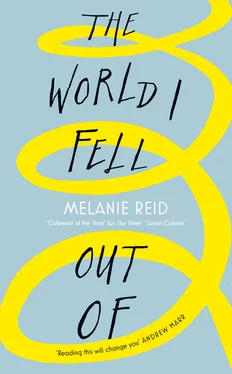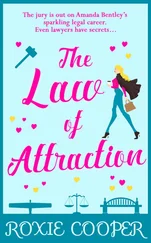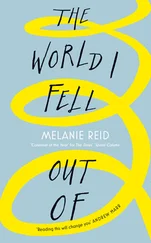‘What d’you want?’
It was Swinging Brick and she was pissed off.
‘I feel awful,’ I said. ‘Please …’
‘We’re busy with other patients. We’ll get to you when we can.’
I never cried out again.
Lots of other patients vocalised their distress; I listened jealously to them screaming and yelling, calling out repeatedly. I was too repressed, too polite. Posh girl in bedlam. It’s only funny now, much later. How I used to envy them their release, these unseen uninhibited souls who raged aloud, who set loose their pain upon the world at large. I wished I too could wail and curse. The way I’d been brought up, you suffered in silence, you were never rude, never made a fuss. There was one voice I often heard shouting at night – a young argumentative male who roared with anger and rage, despair coming from the deepest, darkest torture chamber. ‘Why?’ he used to shout. ‘Why can’t I fucking move? Just tell me why.’
I asked Christine about him.
She sighed. ‘Oh, that’s Snafu. He’s one of mine too.’
‘Is he OK?’
‘He’s finding it hard.’ She sounded sad. She didn’t say any more. I would find out later for myself.
In general the cursing was epic. Legendary. When West of Scotland working man meets catastrophe all he needs is a victim to let rip upon. The spinal unit had a resident psychologist, a gentle New Zealander, a bit of a waffler who must have helped some people lost in the shock of paralysis, but I found him irritating. Everything he said seemed anodyne. But then who wouldn’t seem ineffectual, with the unenviable job of counselling people in the rawest of grief? We existed in a world beyond platitudes, beyond consolation. On the ward, I still couldn’t raise my head to see anything but I lay and listened, as would a blind person, to the voices and the noises.
The darkest of five-star entertainment came one afternoon when the psychologist was sent to counsel an older man who was refusing to cooperate with the nurses. Grunt was a tiny Glaswegian hardman, paralysed from the neck down, who was taking his plight as a personal insult and was either beyond or incapable of reason. He launched a verbal assault upon the hapless Kiwi, a tsunami of violent Glasgow kisses which no curtains round a bed could confine. His tirade was loud, sustained, fluent, uninhibited and utterly priceless: the hairdryer treatment, poetry of the utterly profane, articulating all the pain and fury inside him. Grunt was no doubt a talented curser already, but neuroscience shows that swearing actually helps people biologically to relieve extreme distress, and he was going for it. The caress of the damned, it occurred to me.
‘Fuck off. Who the fuck are you? Jesus fucking Christ what’s it to you? What the fuck do you fucking want? Yer fucking useless waste of space, yer fucking stupid idiotic cunt, nah, nah, get out of my fucking face yer fat cunt and leave me alone.’
‘Now I git it why you’re upsit,’ said the Kiwi, his voice high and mild.
‘Upset, you useless piece of shit? I’ll give yer fucking cunting upset, you bastard.’
‘B-b-but it would hilp to talk, chick out some thoughts, it’s nicissary for you to ixpress yoursilf …’
‘If I could fucking move I’d fucking express maself, I’d wring yer fuckin neck. Just get to fuck … right?’
‘Yis, Grunt … I understand.’
‘Away back to Australia yer stupid speccy bastard, yer useless cunt. Someone should have drowned ye at birth.’
And so it continued. Lying on my back, silently chortling, I was joined by one of the nurses, who dashed in behind my half-pulled curtain, stuffing her apron in her mouth to silence the giggles. We shared a wonderful private, silent moment of hilarity. It was the first time I had laughed since the accident.
Perhaps it was the third week in high dependency when I became aware lots of things were starting to happen. I’d regained the breathing; now it was basic stuff like drinking normally. Previously, much as I had pleaded, the specialist designated two-woman swallowing team, who came round and judged these things, had deemed me unfit to do so. They were the Fat Controllers of the gullet: at one point, they tested me with a sip of tea from a straw while they stood and watched, unsmiling, pens poised over clipboards. They seemed spectacularly humourless, these specialist teams. I sucked with a degree of arrogance. Of course I was fine! But much as I craved it, drinking was weirdly difficult. I found myself spluttering, coughing, and they shook their heads and took the tea away.
After that, I stopped pushing against the system. A few days later, they granted permission. A kindly staff nurse, to whom I had confided my fantasy about a latte, went and bought me one from the café. But what I had yearned for tasted acrid, strong, too hot. I turned instead, gratefully, to sucking weak, tepid, milky NHS tea – baby tea, they called it – through a straw, as she held the cup. I couldn’t believe that I couldn’t hold a cup by myself, but then I had not even started to address the size of physical loss which I faced. Denial piled up on itself; like bricks in a wall. I had nowhere near yet exhausted what Brian Keenan called the strategies of denial, convincing myself that if I could just take back control and start doing things for myself, then all would return to normal. I thought my hands would work if I really asked them to – of course they would! – so I asked the nurse to leave that day’s pile of greetings cards upon my bedclothes in front of me, rather than set them aside for Dave. Anyone can open an envelope! Surely! I tried to pick up the top card and watched with bewilderment as my fingers refused to grip. I didn’t even get to the stage of finding out they couldn’t rip paper. Then the cards slid slowly off my chest onto the floor and I watched them go, passive and helpless. So much for Get Well Soon.
My right wrist, though, had something still going for it. There was still strength there. The hand therapist Leslie had come to see me and, upon her instructions, Dougie went shopping and found me a travel cup with the handle open at the bottom. I could wedge my palm under the handle and lift a mug of that precious baby tea high enough up to drink through a straw – my first independent action. Likewise, when the Gullet Controllers had carried out Protocol Two Testing, Permission to Take Solids, I was given yoghurts and found I was just about able, by myself, to dig in a spoon and then transfer it to my mouth. The feeding tube, a ghastly uncomfortable thing that had been strapped to my cheek and down my throat for weeks, was withdrawn – a peculiar sensation as the nurses reeled the long, thin pipe out of my stomach via my nostrils, as if hauling in the garden hose. At the time I took little notice of such progression, unimpressed, impatient merely that I was so feeble at simple tasks. As I mocked and fretted, denial built. Only later, wiser and humbler, did I come to understand the extraordinary significance of this hand–mouth coordination, and how lucky I was: so many people with broken necks, several of them in the unit with me, could not do this basic task and were doomed to total dependency in order to survive. Others needed months of hand therapy, and specially adapted implements, to be able to drink by themselves or reach their mouths with food.
Time to sit up a little, another milestone. I was fitted with a white collar, like a Star Wars Storm Trooper, so that my neck was supported when my bedhead was raised a few degrees for the first time. This meant my first view of the new world. It also meant I saw my legs for the first time. Not good. Nothing – nothing at all – can prepare you for the appearance of those paralysed limbs, sprawled where you do not feel them to be on the bed, lifeless and somehow deeply misshapen. Someone else’s legs, not yours. I felt physically sick. They looked like the Guy Fawkeses we made as children for bonfire night, newspaper stuffed into an old pair of tights, puffy and lumpy in the wrong places, knees and ankles askew like scarecrows. These weren’t my legs at all; they were horrific, alien objects.
Читать дальше












